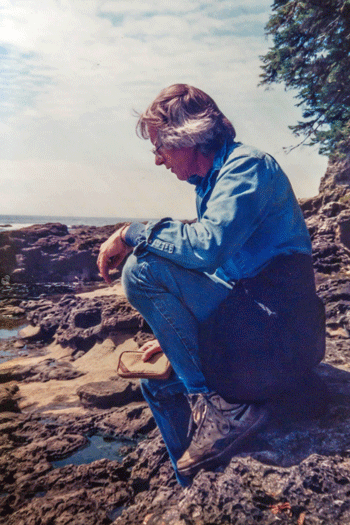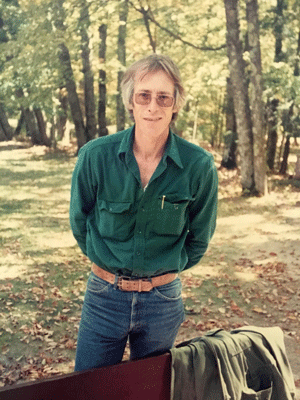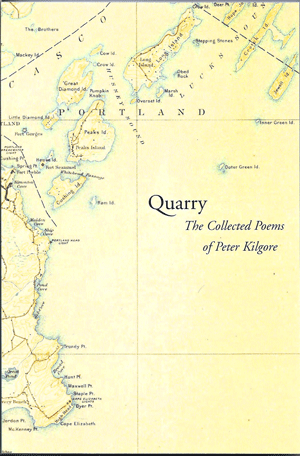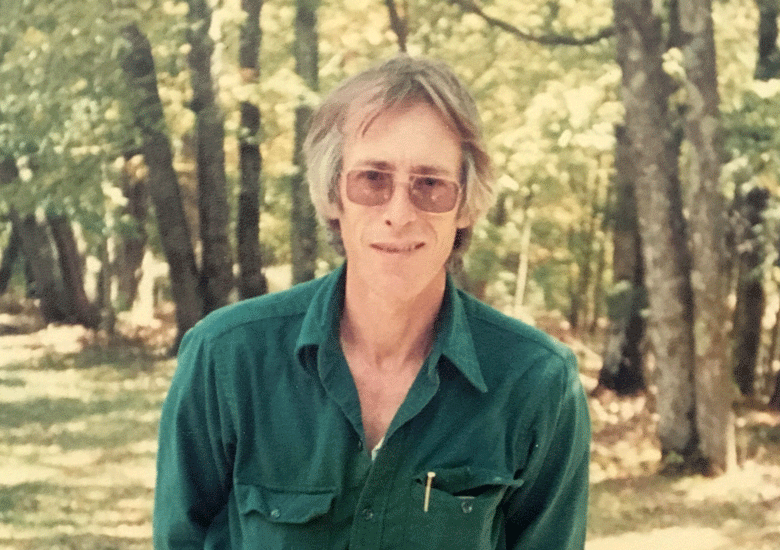
In some alternate history of Casco Bay, Peter Kilgore is the poet laureate of Long Island.
His terse, descriptive lyrics written during the 1960s, ’70s, and ’80s evoke so purely the sights, sounds, and sensibilities of the island as experienced by human beings, if not cormorants, clams, and wind as well, that the island residents together with Portland’s sagacious cultural commissars assign him a sort of shaman-like status, in which he is responsible for caring, through words, for the psychic health and well-being of the island community.
He is spectacularly successful. The vivid, concrete spirituality of his poetry in books like Drinking Wine Out of the Wind and poetic series such as “Island Poems” and “The quarry:west end:long island:fall,” draws from deep in his childhood riding Casco Bay Lines ferries between Portland and the island.
He grew up in the Bayside neighborhood in the 1940s and ’50s, before urban renewal razed the elm-lined Franklin and Wilmot street areas of the north side of the neck. His family kept a cottage on Long Island where he spent endless summers, “swimming at Fowler’s Beach, dancing at the VFW Hall, baseball games,” in the recollection of his second wife, Carol, an island resident who “fell in love with Peter when I was ten.”
The “sweet, gentle poet,” as the Portland novelist Agnes Bushell would refer to him in the 1990s, is in high school a skilled baseball and basketball player, then a graduate of Bowdoin College, and later a founding member of the Maine Writers & Publishers Alliance, which eventually becomes Maine’s largest, most prestigious writers group.
He joins the shapeshifting staff of Contraband, Portland’s most influential little magazine of the 1970s, and writes scores of poems, some published in chapbooks like Openings, River/Road, and The Bar Harbor Suite, in the Beat-influenced minimalist idiom of the time—very short lines and dazzling, clever imagery.
His earlier books trace his experiences as a wilderness guide for excursions on the Allagash and St. John rivers. Later come the poems from the island, based on experiences of those brilliant moments of sea, wind, and shore that for centuries have struck human hearts on Maine’s coast, inscribed themselves on memory, and permeated the rest of life. Peter Kilgore’s gift is the ability to translate those inscriptions from his own psyche into words.
In his taut phrases, the island transforms.
“Jerry’s Point” is a place on Long Island’s west end that “I’ve known / since I walked here as a boy”, he says in “A Poem of Naming.” Then by the mid-1970s, memory and imagination assign the point a more powerful appellation: “the Place where Cormorants Cross.”

We, many of us have in one way or another, wished for a shaman, maybe like a Wabanaki m’teoulin, to guide us through the deeply felt but dimly channeled sensibilities that arise while standing on a rock-bound shore. The poet finds the translation of what that world looks like—a name illuminates a place, and the place the name.
Kilgore was consciously influenced by those Native voices who named and illuminated places in exactly this way. Machigonne, “Great Neck,” gets renamed Falmouth for colonial purposes, then Portland, then Munjoy Hill; then inversely Kilgore, descending down to his roots, renames Jerry’s Point, where cormorants cross.
WINE FROM THE WIND
Drinking Wine Out of the Wind might have been the book to launch a laureate. It narrates a micro-odyssey from city to island to windswept illumination along the shore. It opens with names of boats (“THERESA / CARACARA / APRIL GALE”) seen on Portland Harbor, then tracks a ride to the island through overheard snatches of ferry-deck conversation (“he roamed / & he wandered / he wandered / & he roamed // what he needs / is a good / sound thrashing”).
A few poems on, he’s walking the island, sees the year’s first crocuses in a garden off the road, smells wood smoke through rain and fog on the way toward the west end.
At Fowler’s Beach he finds sand dollars and blue beach glass, and he’s “WINDSTUNNED” in the April gale. Anyone who’s roamed Atlantic island shores recognizes the exhilarating bite of this image.
It’s elemental. And it leads to a spontaneous prayer to the spirit of the sea:
O-
CEAN
send
me
your
biggest
wave
(all
clichés)
YOUR
AWE
There in the “fists” of wind on the beach, his words, “all / clichés,” seem inadequate to the feeling. Gulls, herons, cormorants too are socked by the breeze; the sun on the sand reveals a “micascopic / universe”; and by the time he starts “thinking about spending / a day at the quarry”, he’s already swept by swirling natural images into a “CALLIOPE BRAIN” consciousness.
Now, about two-thirds of the way through the journey, comes a turn, a portal “BREAKING / THROUGH” from the startling concrete world of wind and birds to a world of psychotropic transformation:
i high
on grass
see
eider
down
the
outer
side of
Overset
Looking, in other words, past Overset Island to a feathery vision of the open sea. Here in the glow of the natural world are the places where the m’teoulin goes, or at any rate, the place where “BRANCHES / talk / to me”. Sufi poets speak of divine intoxication, and Kilgore uses their very metaphor of drunkenness:
WINO
OF THE
WORLD
huddled in a
harbor of stone
drinking wine
out of the wind
Next he walks to the point, crosses Fowler’s Beach hunched in the spring cold, “billygoat[s] the path in front of Bean’s[,] cross[es] the strip to Mt. Hunger” and then “the rocks where Bill Floyd used to moor his boat.”
“I backtrack toward the quarry where they blasted breakwater stone for Overset. A small crescent of juniper and willow. … I draw strength here I have power.
“… I crest the northwest rim stop to gawk as two hawks shot from rocks like puffs of dust in this gale wind. My power! My joy! My place on earth!”
In the spindrift expanse of sea, wind, and “golden apple of the sun”:
this day’s
wine
is mine
rake of wind
earaches
of wind
rapier wind
i’ll be
this day’s
monk
Monk, m’teoulin, Sufi, whatever religious figure you ascribe to it—it’s a ravishing spiritual experience of perennial beauty.
The journey narrated in Drinking Wine Out of the Wind is no doubt an amalgam of Kilgore’s many trips to Long Island through the mid-1970s. His connections to the island continued into the 1990s, even after he moved to Washington state, and up to 1992 when, agonizingly, he took his own life.
The value of a poet often goes unrecognized in his or her lifetime. In some alternate universe, a poetry reading by Robert Creeley at the Unitarian church in Portland in 1989 was not the last place and time I talked with Peter Kilgore. In that parallel universe, his poems strike loud chords into the heart of the island. And poetry’s capacity to uplift, to heal, and to open doors of perception that are normally closed, is a commonly recognized medicine of the spirit.
Here, in this universe, Kilgore’s voice remains, but more distant, singing just the windward side of Overset, like the Wabanaki voices that still murmur just beneath the bustling muddle of Machigonne.
He’s not a laureate, but nonetheless, as critic and poet Carl Little phrased it, a member of a distinguished “roster of inventive poets” from Maine. We are a people implicitly improved by his island voice.
Quarry: The Collected Poems of Peter Kilgore is available from North Country Press in Unity.






